What Do We Do If Motherhood Doesn't "Come Naturally"?
Teasing out the truth for when you feel like a "bad mom"
Our eldest turns 8 this weekend, and in a predictable swirl of nostalgia and self-torment, I’ve been combing through photos of our earliest days together. There’s one of the two of us on our first family outing: all 6.5 pounds of him snuggly and asleep, all 130-something pounds of me curving around his carseat, mustering up a sleep-deprived smile with dark circles around my eyes, puffy from crying. There’s a string of photos from the day he first smiled, his face bumpy with baby-acne that I spent 10+ night-hours googling remedies for. Then there’s a photo I posted on Instagram about a month after he was born. The caption is very 2017 and reads:
“YOU : one month old! Very efficient eater, not great at sleeping, wiggly & squeaky, happiest when held, smiling almost exclusively for dad, reeeaally cute.
ME : so tired, loving you more and more every day, amazed at the human body's capacity to facilitate and sustain life, excited to go back to work, not a natural but figuring it out.”
Not a natural, but figuring it out.
I remember writing that with a pit in my stomach. Surely, I thought, things will click soon. Surely I’ll get the hang of this. Surely I won’t feel this far out of my depth much longer…right?
It was God’s mercy not to answer that question, because 8 years later, I am still very much out of my depth. This isn’t true to every aspect of motherhood. For instance, the fact of my son—the reality of his living being taking up space in my life and home—no longer surprises me, as it very much did in those early days. We’ve lived nearly every day together for 8 consecutive years and I now know the weight of his footsteps and the things that will make him laugh no matter his mood. I know which of his little siblings’ antics will set him off and when to ask him to help me with something. I know what lights him up and what tears him down. I’m no longer surprised by his rhythms and questions…that’s become standard operation around here.
What’s never stopped surprising me though, even after all these years, is how perpetually new I feel at parenting—now I’ve never seemed to graduate from the “novice” phase to settle into a mental framework of my role and responsibilities as a mother that’s defined and predictable enough to decrease the demand on the fullness of my attention. I still feel supremely clumsy in motherhood, prone to second guessing, trusting the advice of strangers on the internet, chalking any “successes” we experience as luck or a one-off win.
Part of my sense of shaky ground is due to the fact that we’ve just continued to have more children. Increased numbers mean increased complexity, with each child presenting a new and terrifying array of needs and expectations as they grow older and navigate new spaces and situations. What’s more, having more children necessarily means having new little ones, and little ones will always demand all of your attention. In fact, our daughter is the two-est two-year-old we’ve ever had. I’ve been quite candid that the early years are years I tend to “endure” rather than “soak up”. (Also that analogy is kind of gross? Like, there are so many fluids in the little years, so…soaking…you know?)
So, there’s a good chance that I’ll hit a stride when the youngest is a little more self-sufficient, or when they’re all in school. But somehow I doubt that them being bigger or less physically demanding of me is the only issue at hand. Every new thing with each child, even once they start putting on their own shoes, is staggering to me. With each new trial, each new season, I’m knocked over by the breadth of responsibility to bear witness, to steward, to correct and comfort, nourish and navigate these days with all that they are and all that they could encounter and all I could do badly and all that I so desperately want to do well.
The primary issue, I think, isn’t that we keep having babies or that we’re still in a season of intense physical demand. What’s really keeping me in this perpetual state of feeling like knee-knocking beginner is that who I am as a mother in real life is a pretty far cry from who I imagine and expect myself to be as a mother. You see, I’ve always had an idea of the kind of mother I’d be: prepared, patient, easy-going and proficient. The mother I thought I’d be is one with an ever-stocked snack-and-diaper caddy and a first aid kit in the back of her car; a mom with such a robust theology of parenthood that her children’s misbehavior would come as no surprise, certainly not enough to send her into a rage. The mom I thought I’d be is a mom who knew herself to be good at it. And, if I’m honest, most days I don’t feel good at it.
Much of my problem, I know, is that I’ve not had to struggle much to pick up new skills and roles with at least some level of proficiency in a reasonable timeframe. If I want to become good at something, I usually can with an expected amount of training and discipline. With time and practice, the skills I want to adopt become easy to accomplish, they begin to feel natural. I once did not know how to cook, but I wanted to be a good cook, so I practiced cooking and now I know to salt my pasta water! I once did not know how to lift weights, but wanted to be strong, so I got a very cool app on my phone that coaches me and now I can squat more than my body weight!
If I try something and find myself to be bad at it (tennis, budgeting, card games), my singular strategy is avoidance. If I’m not good at it and cannot seem to get better at it quickly, I simply stop doing it and politely decline invitations to try again. It is human nature to feel at home in our proficiencies, to build our lives around them: we like to feel good at what we do, we like (and expect) to be rewarded for what we do well.
Motherhood, of course, does not fit into this pattern. For starters, the reward system is…well, delayed, for sure. But also incredibly nebulous. Even if one is a “natural” at motherhood, even when the tasks and responsibilities of motherhood come “like riding a bike”, the outcome of a mother’s labor isn’t guaranteed. Secondly, no one can give parenting a test-drive. Sure, you can babysit, but babysitting is to parenting what mad-libs is to writing a novel: similar supplies, vastly different endeavors. Once you’re “in it”, you’re in it, whether or not it “comes naturally” to you.
I hate not being good at things. Hate it. But feeling bad at something as consequential as mothering?! The weight can be crushing. The burden of not feeling “like a natural” as a mother is made up of two anvils: the first is the humiliation that comes from the sense that mothering should “come naturally” to all women and the stark awareness that others seem to be performing way better than you are. The second anvil is the crippling fear of the potential outcome of your perceived insufficiency—namely, the flourishing of your children. There is perhaps no relationship with as great a ROI as that between a parent and a child, and, conversely, no role with as much capacity for damage. Mothering my children is the one thing I want to do with as little error as possible, and yet it’s the stage for the vast majority of my errors, and there are many.
Parenting culture will have us believe that the outcome of our children’s lives depends on our proficiency as their parents: how attentive and attuned we are to their emotions, needs, and nuances. Parenting culture will sell us courses and accompanying workbooks to ensure our children grow up without having to endure the trauma of parents who just don’t seem to “get it”. But parenting culture, with all its hacks and experts, can’t fix the actual problem, which has to do with a mother’s soul, not her proficiency.
I mentioned last week that I can’t stop thinking about the “older brother” in the Parable of the Prodigal Son, how much I see myself in him. The older brother is the “good kid”, he’s following the rules, doing his work with an assumed excellence. He learned the skills necessary to prove himself valuable to his family and he fulfills his responsibilities. He’s good at what he does and he knows it. He doesn’t need to ask for help. He knows that there is a reward for being proficient and that’s what he expects to receive.
And it’s precisely because he’s so “proficient” that he’s unable to receive the gift of joyful communion with his father who loves him and his brother who’s come home after a long, brutal season of isolation and grief. When the reward for a proficient son is given to the screw-up, the older brother is understandably furious. You’re throwing a party for him?! he balks at his dad. Where’s my party? Don’t you see the dirt on my hands and the fruit of my labor? Haven’t I earned your praise and wealth? Certainly more than this scum bag kid! He’s so appalled by the love and favor of his dad toward his brother that he won’t even go inside the house. His proficiency made grace repugnant to him. (I’m working on a piece about this specifically, but need a little more time and space to work it out.)
Here’s how this meets me in motherhood: I’ve been relatively proficient at the things I care about for much of my life. I’ve not had to ask for much help. I’ve spent most of my life being good enough at what I’m doing to anticipate (usually rightly) positive outcomes from my labor. I receive the “reward” of my labor and it makes sense that I receive that given the proficiency with which I labored. For my whole life I’ve been the “older brother” doing the work and expecting the assumed positive outcome.
But when, in motherhood, I feel like a perpetually incompetent novice, when my lack of proficiency is on constant display, my “older brother” sensibilities begin to condemn the ways I just cannot seem to get it together as a mother—I begin to see myself as the secrew-up younger brother who is altogether undeserving of anything good. I’m appalled by my confusion and selfishness, disgusted by my failures, convinced that the best course of action is to just throw the whole thing out because no good could ever come from that mess of a person. I’m quick to despair the inevitable damage I will impose upon my children. I become so blinded by my “older brother” inability to muster the skills or patience or proficiency to meet the standard I set for myself that I can’t perceive the form of my loving father moving toward me, kindness in his eyes, asking me to please come inside and have something to eat. The “younger brother” in me knows my only hope is to go back, crawl back, to my father’s house. That if I just get over my self-hatred and self-pity, I’ll find more than enough back at home. But my “older brother” self pushes me away. There’s no place for you here, I tell myself, you’ll never earn your place back.
The verse is used almost enough to be considered a cliche, but I want to spend a little time on it to close. Saint Paul is writing to the church in Corinth about how much suffering he’s endured in pursuit of Christ: it’s a lot. On top of all the external suffering, he’s got this thing that he just can’t shake: he calls it the “thorn in his side”. We don’t know what the “thorn” is, though many have speculated. What we do know is that he’s asked God to take it away three times and that God’s answer is “no”.
Therefore, in order to keep me from becoming conceited, I was given a thorn in my flesh, a messenger of Satan, to torment me. Three times I pleaded with the Lord to take it away from me. But he said to me, “My grace is sufficient for you, for my power is made perfect in weakness.” Therefore I will boast all the more gladly about my weaknesses, so that Christ’s power may rest on me. That is why, for Christ’s sake, I delight in weaknesses, in insults, in hardships, in persecutions, in difficulties. For when I am weak, then I am strong. (2 Corinthians 12:7-10 NIV)
I cannot tell you how many times I’ve begged God to “just make me a good mom”—to just give me an enormous lump sum of patience and wisdom and kindness and contentment. But God’s answer to me is the same as it was to Paul. God has allowed the thorn to remain lodged securely, right there in my side. Now, I’m not saying my kids are messengers of Satan (lol). What could be, though, is that nagging sense that it’s all up to me and that if I don’t get it exactly right, everything is going to fall apart. What could be a messenger from Satan is the thorn in my flesh that says my weakness is nothing more than a threat to my kids and my own reputation, a source of endless shame and condemnation. What, I think, is a message from the devil is that me not being “naturally proficient” at motherhood is a sure sign that this whole beautiful thing is going to burn and it will be my fault.
The gospel of Jesus meets me right here in that tender wound and says: No! Don’t you see? Look at the hands that formed you, the hands that formed those beautiful babies! Look at how they hold you now, how they mend all these fractures and can stretch all the way out into all the days that are coming. Look at all the grace they can hold, all the tears they can wipe away, all the burden they can heave off your shoulders!
Implicit in my pleas for God to “just make me a good mom” is my burning desire for a life in which I don’t need to ask God for help all the time. Mercifully, he does not give me what I want. Instead, he says, I will give you a deeper and deepening awareness of just how much help you need at the same time I give you a deeper and deepening awareness of how much help I have to offer. It turns out, God, opening my eyes to my incompetency in motherhood is the best chance I have at teaching my children what the gospel is—not an expected reward for the proficient, but the unending display of God’s mercy, kindness, provision, patience, and love in the lives of people who could’ve never earned it.
If I break down my fury with my lack of proficiency to its nucleus, what I find is a fundamental disbelief in God’s grace: not just to forgive me when I screw up, but to carry me and my children into a future that isn’t marked primarily by me (positively or negatively). I also find an unwillingness to trust God’s character as one who’s love is so great to welcome the kid who behaved very well as well as the kid who didn’t, well, do I even have a grasp on the gospel of Jesus in the first place?
So, I guess that’s what I’m trying to do. Receiving grace in motherhood gives me the permission to look at those moments when I do screw up, even badly, and say “there is still hope”. It gives me the humility to get on my knees and take their little hands in mine and look in those blue eyes and say “I am so sorry I said that. I want to be in charge of everything but I’m not and that makes me angry enough to say things I don’t mean. Will you forgive me? Will you let me try again?” And it gives me the courage to actually do that, to try again, this time in the freedom of knowing that God will do something mysterious and beautiful in the spaces I will inevitably fall short.
If I could go back 8 years, I’d tell myself that “figuring it out” won’t look like becoming a mom who doesn’t need to trust God; that the sign of her success isn’t how easily motherhood comes to her. I’d tell her that this enormous thing in front of her is actually bigger than she realizes and that it isn’t going to “click” in the way writing or teaching has. What will “click” is her understanding of grace. Although, “click” is too quick, too instant a word. So, actually, I’d say it won’t “click”, it will expand the way that water spreads, slowly and beyond the boundaries she’s drawn in unbelief and fear. With her slow-growing mother-confidence will grow her knowledge of God and his love for her and for her babies and the peace that transcends her understanding and proficiency.
Love to you, friends.
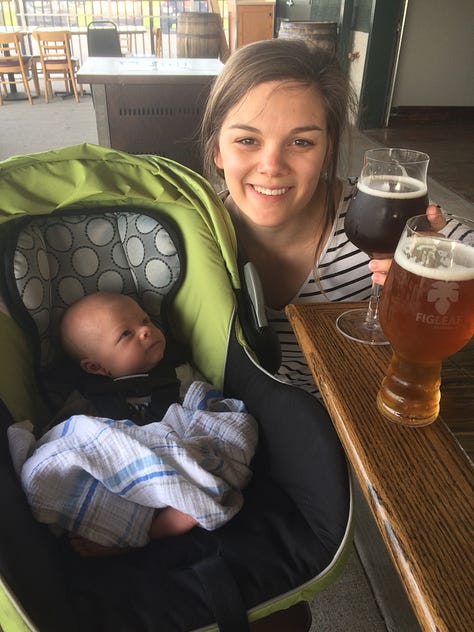
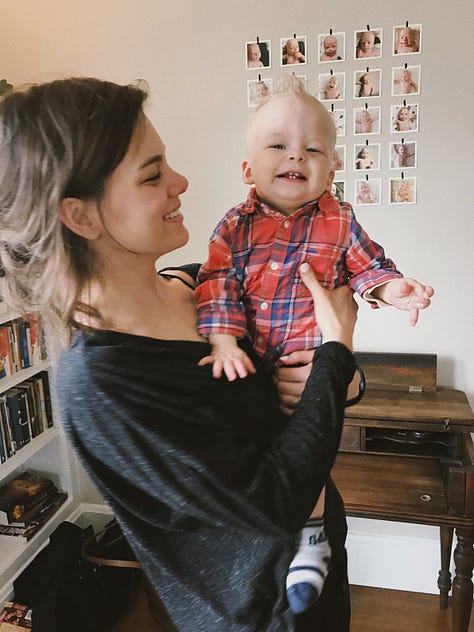

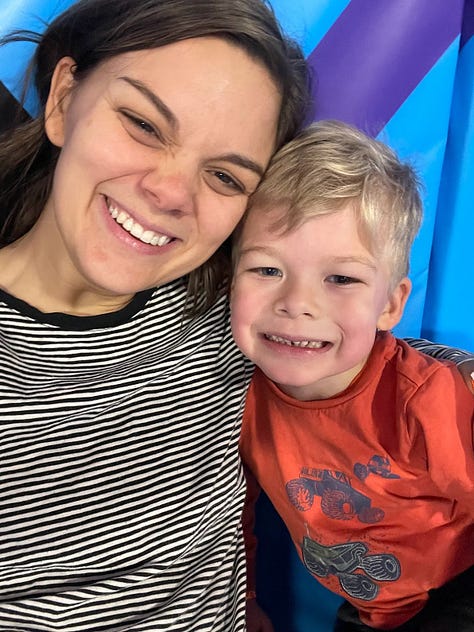
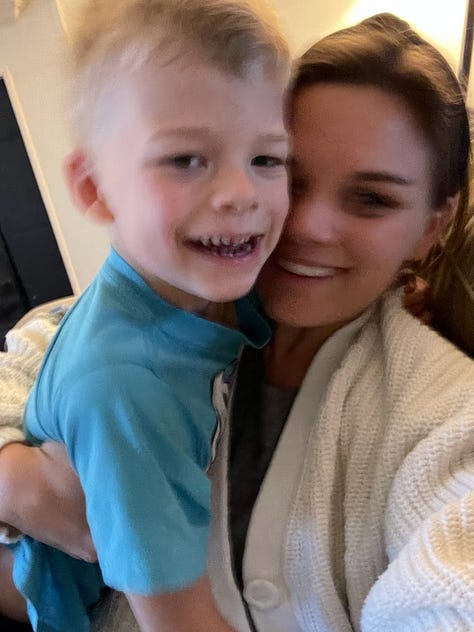
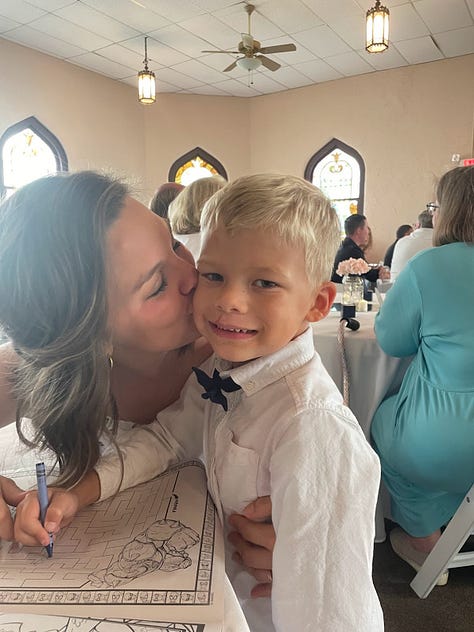
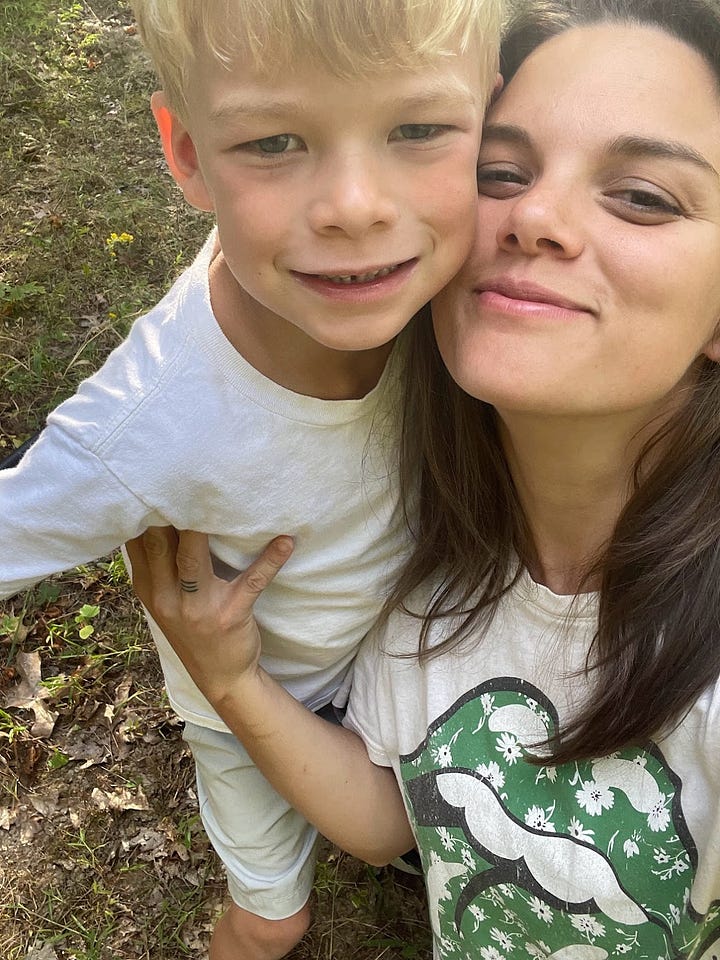



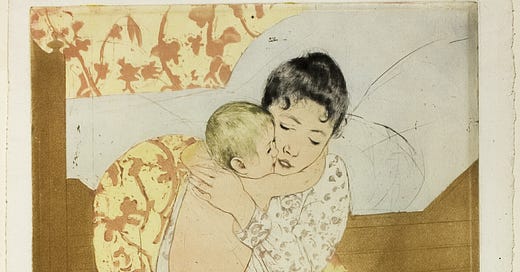



“I’ve been quite candid that the early years are years I tend to “endure” rather than “soak up”. (Also that analogy is kind of gross? Like, there are so many fluids in the little years, so…soaking…you know?”
L…O…L. Great read. Thank you.
Last night I had a heart to heart with Jesus whilst journaling, and this article in addition to another of yours I read about mother’s bellies, is literally an answered prayer. The words you used… despair, and disgusted and fear are all words I wrote last night, about my own motherhood journey. I have a 4 year old, 2 year old, and I am 22 weeks pregnant with our third. I am feeling myself expand physically, and SO spiritually attacked in all arenas, it feels like I haven’t been able to catch my breath for some time. Then God placed your writings in my life today. Your internal dialogue, aspirations and perspective appear to be very similar to mine. It gives me peace to know I’m not the only one who feels this way, that the evil one is not remotely creative in his tactics and doesn’t reinvent the wheel for anyone, and that someone was able to articulate my feelings and thought process in a way I have been deeply struggling to. Thank you, thank you, THANK YOU for your writing. What a gift it was to me today! I even thought about printing them out so I can read them every time I start going down the path of feeling defeated. God Bless you!